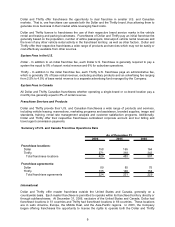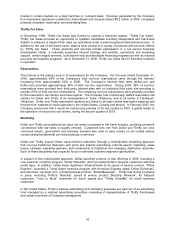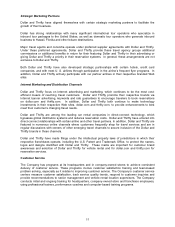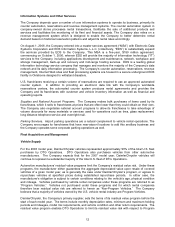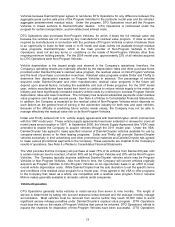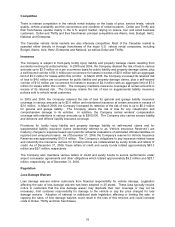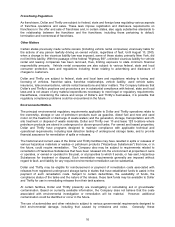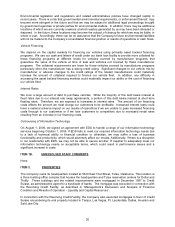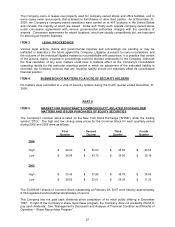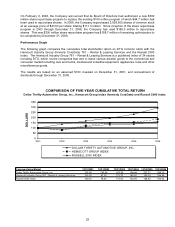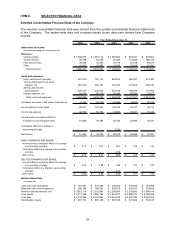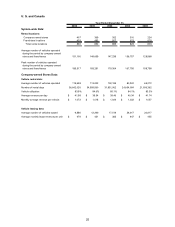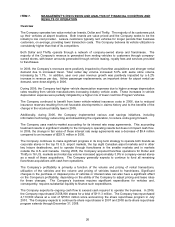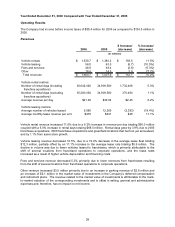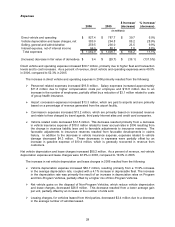Thrifty Car Rental 2006 Annual Report Download - page 25
Download and view the complete annual report
Please find page 25 of the 2006 Thrifty Car Rental annual report below. You can navigate through the pages in the report by either clicking on the pages listed below, or by using the keyword search tool below to find specific information within the annual report.Commission Act and has been upheld by several courts. However, there are several legislative
proposals in certain states which, if enacted, would define which surcharges are permissible and
establish calculation formulas which may differ from the manner in which we set our surcharges.
Enactment of any of these proposals could restrict our ability to recover all of the surcharges we currently
charge and may have a material adverse impact on our results of operations.
Fuel Costs
Limitations in fuel supplies and significant increases in fuel prices could have a material adverse effect on
our financial condition, results of operations and cash flows, either by directly discouraging customers
from renting cars, causing a decline in airline passenger traffic, or increasing our operating costs, if these
increased costs cannot be passed through to our customers.
Third Party Internet Sites
The Internet has had a significant impact on the way travel companies get reservations. For 2006, we
received 68% of our non-tour reservations from the Internet, with 39% coming from our own Internet Web
sites, dollar.com and thrifty.com. The remaining 29% of non-tour reservations were provided by third
party Internet sites. No single third party Internet site provides more than 9% of our non-tour
reservations.
Future changes in the way travel is sold over the Internet or changes in our relationship with third party
Internet sites could result in reduced reservations from one or more of these sites and less revenue.
Liability Insurance Risk
We are exposed to claims for personal injury, death and property damage resulting from accidents
involving our rental customers and the use of our cars. In March 2006, we increased the level of self-
insurance to $4.0 million per occurrence, plus a self-insured corridor of $1.0 million per occurrence for
losses in excess of $4.0 million with an aggregate limit of $7.0 million for this corridor, and increased the
level of self-insurance for general and garage liability to $5.0 million. We maintain insurance coverage for
liability claims above these self-insurance levels. We self-insure for all losses on supplemental liability
insurance policies sold to vehicle rental customers. A significant change in amount and frequency of
uninsured liability claims could negatively impact our results.
Litigation Relating to the Constitutionality of the Removal of Vicarious Liability
On August 10, 2005, the federal Highway Bill was signed into law and removed unlimited vicarious liability
for vehicle rental and leasing companies, limiting exposure to state minimum financial responsibility
amounts. Before vicarious liability was removed, the owner of a vehicle in certain states would be liable
for acts by vehicle drivers even though the vehicle owner was not directly responsible. This federal law
supersedes all state laws on vicarious liability for automobile lessors. Since the Highway Bill became law,
its constitutionality has been challenged in some state courts, including subsequent appeals. If these
provisions of the Highway Bill were overturned, we would be subject to significant exposure to insurance
liabilities and higher insurance costs, which would materially impact our results.
Environmental Regulations
We are subject to numerous environmental regulatory requirements related to the ownership, storage or
use of petroleum products such as gasoline, diesel fuel and new and used motor oil; the treatment or
discharge of waste waters; and the generation, storage, transportation and off-site treatment or disposal
of waste materials. We have made, and expect to continue to make, expenditures to comply with
environmental laws and regulations. These expenditures may be material to our financial position, results
of operations and cash flows. We have designed programs to maintain compliance with applicable
technical and operational requirements, including leak detection testing of underground storage tanks,
and to provide financial assurance for remediation of spills or releases. However, we cannot be certain
that our programs will guarantee compliance with all regulations to which we are subject.
19


